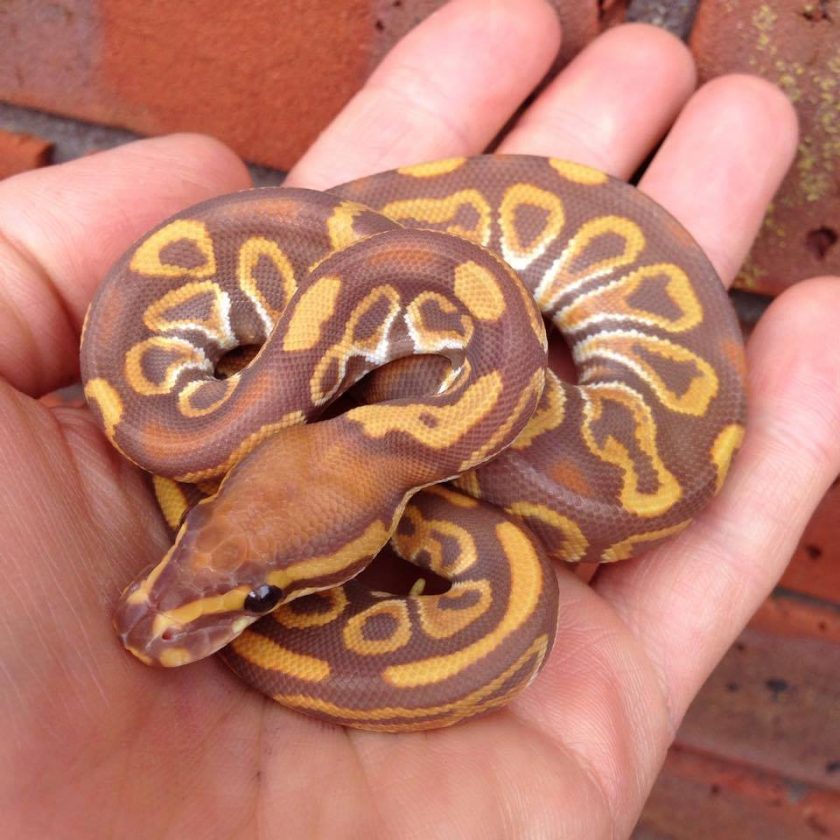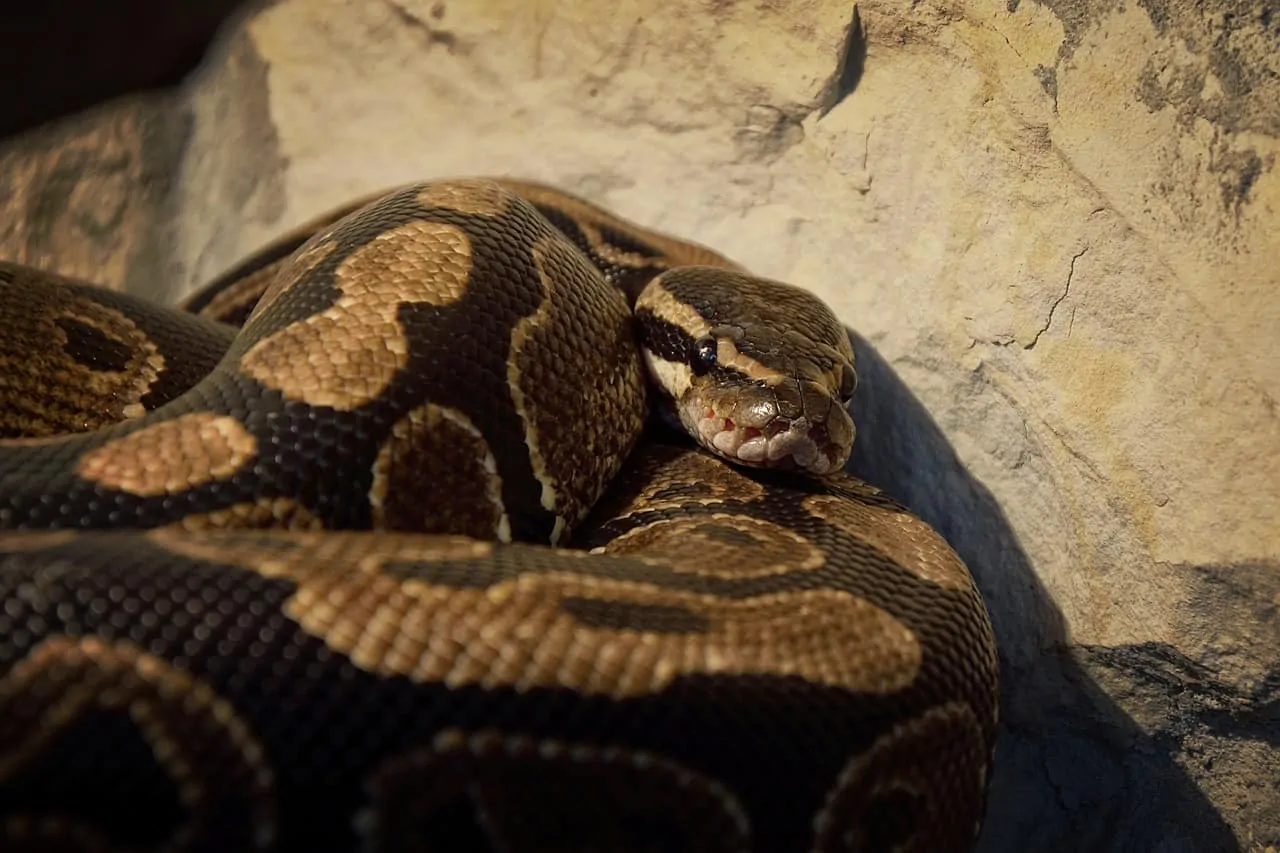Ball pythons are a bit notorious for refusing food. This isn’t as common in the modern world, given that most ball pythons on the market are now captive bred individuals, but in the past, this was not the case. Most ball pythons on the market a few decades ago were wild-caught animals, who had “imprinted” on wild prey items that were unavailable to snake keepers.
But even captive-bred ball pythons will occasionally refuse food, which leads to considerable frustration among keepers. It also leads to anxiety, as keepers are forced to wonder if their snake is going to starve before he resumes feeding.
How Long Can a Ball Python Survive Without Food?
It’s difficult to definitively state the length of time any animal can go without food, and this is especially difficult to do with snakes. As you probably know, many (if not most) snakes eat relatively infrequently. Fasts lasting several weeks are exceedingly common among serpents, and some may go without food for months.
Caveats aside, it’s likely that the average healthy adult ball python can survive several months without eating. Many refuse food during the breeding season, and some remain fat and healthy on a once-per-month feeding schedule.
I have personally cared for multiple ball pythons who’ve gone about one year without eating voluntarily, and there are reports of individuals fasting for twice this long. This obviously isn’t ideal, and snakes who go this long without food are almost always in poor physical condition. They’ll generally require veterinary attention and a lengthy recovery period to return to peak health.
Suffice to say, fasts lasting about a month or so are no cause for concern – it will take much longer for an otherwise-healthy ball python to starve. I generally try to encourage keepers to avoid worrying at all until their snake has fasted for a month.
How Long Can a Baby Ball Python Go Without Eating?
While adult ball pythons can fast for many months without starving, young ball pythons lack the fat reserves to last as long as their mature counterparts. They can still survive for longer than a human, dog or cat could without eating, but they will not last as long as adult ball pythons will.
Once again, it is difficult to give precise estimates of the length of time a hatchling ball python can go without eating, but it is likely at least one month. So, don’t worry if your baby ball python refuses food for a week or two – he’ll likely resume eating quickly enough.
But, if your baby ball python refuses food four consecutive weeks in a row, you’ll want to contact your vet or a more experienced keeper for advice. From this point forward, it will be very important to address the issue and entice the snake to eat quickly, as young snakes may go downhill fast.

Is It Normal for a Ball Python to Not Eat?
In the wild, ball pythons likely go lengthy periods of time without eating. In some cases, this will occur because they cannot acquire food, but there are other situations – such as during the breeding season or shedding cycles – when it is possible that they’d actively refuse food as they do in captivity.
Nevertheless, while I wouldn’t characterize food refusal among ball pythons as “normal,” it is very common. Generally – and as long as they don’t do so for long time periods – occasional fasts are no cause for concern.
How Often Should You Feed a Ball Python?
Experienced keepers and breeders debate the ideal feeding schedule for ball pythons, but most would agree that a once-per-week feeding schedule is a good default approach. However, young ball pythons may be willing to eat every two or three days while growing rapidly, and large, mature males may remain at a healthy bodyweight when fed once every four weeks or so. You must also consider the size of the prey you’re offering – two large mice may provide more calories than one small rat, for example (depending on your definition of “large” and “small”).
As with any other snake species, you must let your snake’s growth rate (if it is not yet mature) and body weight inform your decisions. If your snake is not growing as quickly as you’d like, you may want to increase the feeding frequency. Conversely, if your snake is packing on extra pounds, you should reduce the feeding frequency slightly.
If you are unsure about your ball python’s body weight and condition, seek the guidance of your vet or a more experienced keeper.
Can a Ball Python Starve Itself to Death?
In rare cases, ball pythons may fast long enough to lead to their death. This is somewhat rare among captive-bred individuals, but it is possible. So, while it will take a ball python quite a long time to starve itself, you must realize that it is within the realm of possibility.
Accordingly, while you needn’t worry every time your snake refuses a single meal, you should always solicit help anytime your snake refuses food for a month or more. This is particularly true for snakes that appear to be losing weight, acting strangely, or exhibiting any other signs or symptoms of illness.
Take care!
While ball pythons are infamous for refusing food at times, keepers should understand that this is not as common as it used to be. Also, while food refusal can be cause for concern, you needn’t panic anytime your snake refuses a single meal. Until you reach or pass the one-month mark, there’s usually no cause for worry.
We hope you’ve enjoyed this article and would encourage you to share it with your snake-keeping friends if you found it helpful. Also, be sure to share your ball python fasting stories with us in the comments below!



10 Comments
I have an albino royal ball python about 3 yrs old hasn’t eat for 6 m it has lost bout 100g since nov should I be worried yet
Hi Martin,
It’s normal for ball pythons to lose some weight when they fast. Adult ball pythons sometimes refuse food for extended periods, especially during cooler seasons or breeding season.
A weight loss of 10-15% of their body weight generally isn’t a major concern. However, you’ll want to consider a few things.
Is it fall or winter where you are? This could be a seasonal fast.
If your ball python is a male, he might not be interested in eating because his focus is on breeding.
It’s also important to rule out any health issues or stress as reasons why your snake might not be eating.
The first thing I recommend is double-checking your husbandry. Make sure the temperature gradient in the enclosure is correct – it should have a warm side of 88-92°F and a cool side of 76-80° F. Humidity should be around 55-60%, with some higher humidity spots near hides.
Does your snake have enough secure hides to feel safe? If you see weight loss continuing past that 10-15% range and you’ve made sure your husbandry is top-notch, consider a visit to a reptile vet. They can rule out any illness or parasites.
Keep offering food about every week or two. You can experiment with different prey sizes and types, or try leaving a freshly killed item in the enclosure overnight.
For more information you can check our article on ball python fasting “How Long Can a Ball Python Go Without Eating”
I have had a ball python go 6 months without eating. As long as they maintain their body weight they will be fine. Just keep offering as you would normally do and when they are ready they will eat again
Hi Travis,
Yes, you are right, It’s normal for adult ball pythons to sometimes not eat for 3-4 months, and they can go up to 1.5 years without food as long as they maintain their body weight and health. However, if your python isn’t eating for a long time, it could be due to shedding, illness, or incorrect cage conditions. Keep an eye on their health and habitat, and if you notice any concerning changes, consider consulting a reptile vet.
Great job caring for your ball python!
Sharing my experience: It’s hard to find a pet sitter who is willing to care for snakes when I’m on vacation. I’ve gone on 3-week long vacations, and my BP has been fine without being fed. Two weeks before the vacation, I increase the feeding frequency to twice a week, and the day before vacation, I double the feed (if he is willing to take it). He is housed in a 55gal tank with a 10gal tank within it as the water source – so there is no issue with running out of water (I’ve found that a water dish evaporates too quickly). Lights and heating are controlled by a timer.
Hope this helps.
Thank you for sharing your experience. It sounds like you have a good plan for taking care of your ball python while you are away. If you ever have any questions or need further advice, feel free to reach out. Happy pet keeping!
I got a ball python a few months back and she’s done amazing, I think shes around 3/4 yrs old but shes refused to eat this past month, even tucking into a corner when the mice come near her so we need to take them back out; any tips?
Hi Jasper,
I’m sorry to hear that your ball python is refusing food. It could be due to a variety of reasons, including stress or a change in environment. First, make sure her enclosure is set up correctly with the right temperature and humidity levels, as well as plenty of hiding places for her to feel secure. Secondly, make sure you’re feeding her the right type of food for her age and size.
For more tips on encouraging your ball python to eat, I recommend reading this article:
https://www.terrariumquest.com/ball-python/not-eating/
I hope this helps! Best of luck.
Just got a banana spider ball-python from a friend he is a year old, he told me to feed him the next day, so I tried all the steps but he refused to eat. Seems also a little stressed by curling up and tucking his head in. So after saying all this, is this a normal behavior for a new snake even if he is a year old?
Yes, it is normal for a new snake to be stressed and not eat. This can be due to the change in environment or unfamiliarity with the food.
It is important to provide your new pet with a safe and comfortable environment free of predators and other disturbances. Provide plenty of hiding places within the enclosure and make sure the temperature and humidity are within the optimal range for your species.
Offering multiple food items and continuing to offer them over time is also important as snakes may need to get used to a particular food item before they decide to eat it.
Some additional tips you can use include maintaining consistent feeding times, increasing the humidity during feeding, adding tasty or smelly items (such as tuna or fish) to the food, and offering live prey. Be patient and eventually your snake should start to eat.
Good luck!